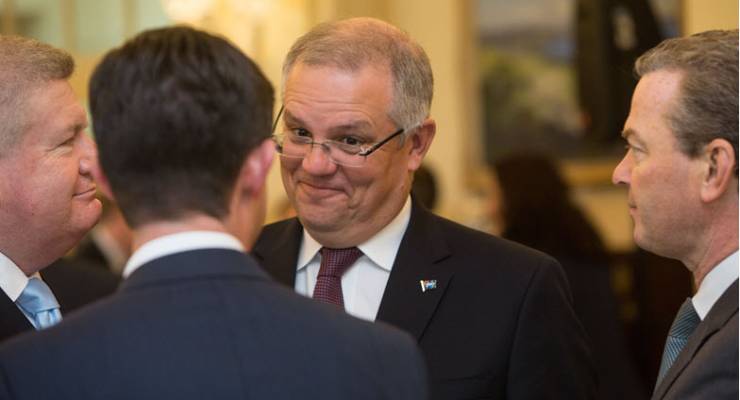
Universities in Australia have faced a lot of uncertainty in recent years, with bills for funding cuts being repeatedly introduced to the lower house and then rejected in the upper. Students, universities and governments have all been frustrated and concerned about how the issues will be resolved. Here, Crikey outlines the events of the more recent past.
May 2013 — then-treasurer Wayne Swan delivered the budget for the Labor government. He proposed changes to higher education funding — the first two of which came into effect this year. These proposed changes were:
- Abolishing the 10% discount that applied to students paying their university fees upfront;
- Converting student start-up scholarships (given by Centrelink) into loans; and
- Lowering the tax-deductibility limit of self-education courses.
May 2014 — a new government and a new plan. In the federal government’s May 2014 budget, the new Coalition government outlined plans to:
- Deregulate university fees by removing the “cap” price universities could charge students for their courses. These “caps” were to be removed from 2016;
- Charge an interest rate on FEE-HELP loans, which would have replaced the current system using the inflation rate. The proposed changes at this time, were to use the government bond rate equivalent instead which generally has a higher rate than inflation.
- The Liberal government also had plans to lower the income threshold for repayments on the FEE-HELP loans. At this time, the government outlined a plan to lower the amount by 10%. Therefore, the new threshold planned for 2016-17 was $50,638.
May 2014 — students at universities across Australia protested the planned changes to higher education funding. Following the protests, then-prime minister Tony Abbott and then-education minister Christopher Pyne cancelled a planned appearance at Deakin University in Geelong, citing security concerns.
December 2014 — then-education minister Christopher Pyne had his higher education reforms bill voted down in the Senate. Pyne vowed to have a new bill ready the following day, which Pyne said would address the concerns of the Senators. The bill was defeated 33-31 with independent senators Jacqui Lambie and Nick Xenophon not persuaded to support the bill.
February 2015 — protests continued with students being pepper-sprayed while protesting in Sydney at a talk given by Pyne. About 40 demonstrators managed to push their way into the foyer of the Sydney Masonic Centre, before being escorted out.
March 2015 — in an interview on Sky News, then-education minister Christopher Pyne had an exchange with David Speers that would come back to haunt him. Pyne stated to Speers that he “[was] a fixer” and he’d “fixed” the issues the Coalition government had been having in relation to funding for scientific research jobs. Originally, the funding for these positions was linked to the bill on the deregulation of university fees.
March 2015 — in an interview on Insiders, Pyne outlined to Barrie Cassidy that should the Senate not pass the bill, potentially the consequences would be that the $150 million National Collaborative and Research Infrastructure Scheme would no longer have funding.
March 2015 — the government amended the bill so funding for scientific research was no longer linked to the deregulation of university fees. The 20% cut to Commonwealth funding of universities was also removed. However, the changes were not enough for the bill to pass in the Senate.
September 2015 — the government has a change in leadership, with Malcolm Turnbull becoming the new Prime Minister of Australia. This also meant a cabinet reshuffle, in which South Australian Senator Simon Birmingham took on the role of Education Minister. Pyne moved into a new role as Industry Minister.
September 2015 — Birmingham states his focus in education will be on vocational education and training. Birmingham also said he would be speaking with key figures in higher education areas in order to work out how best to proceed when looking at higher education reforms.
April 2016 — although the government hadn’t announced its latest plans for university funding and deregulation, protestors were present at Birmingham’s visit to the University of Sydney. Protesters were forcibly removed from the library by riot police.
May 2016 — in the 2016-17 budget, the government said it would delay the changes to higher education as suggested in their 2014-15 budget to allow for further consultation. The government said they would announce the new suggested changes to higher education in 2017.
April 2017 — the Department of Education released data on student satisfaction from universities across Australia. The data showed each university how satisfied students were with the university overall. The University of Notre Dame topped the list, with the University of Technology Sydney receiving the lowest scores overall.
May 2017 — Education Minister Simon Birmingham announced a new plan for higher education where graduates will begin paying back HECS debt once they are earning $42,000. Currently, students begin repayments when earning about $55,000. The repayments will fall on a scale of between 1% to 10%, depending on income. The plan would also generate a 7.5% increase in the cost of degrees to students by 2021, beginning next year with a 1.8% price increase and a funding cut to universities in the form of a 2.5% “efficiency dividend”.







Crikey is committed to hosting lively discussions. Help us keep the conversation useful, interesting and welcoming. We aim to publish comments quickly in the interest of promoting robust conversation, but we’re a small team and we deploy filters to protect against legal risk. Occasionally your comment may be held up while we review, but we’re working as fast as we can to keep the conversation rolling.
The Crikey comment section is members-only content. Please subscribe to leave a comment.
The Crikey comment section is members-only content. Please login to leave a comment.